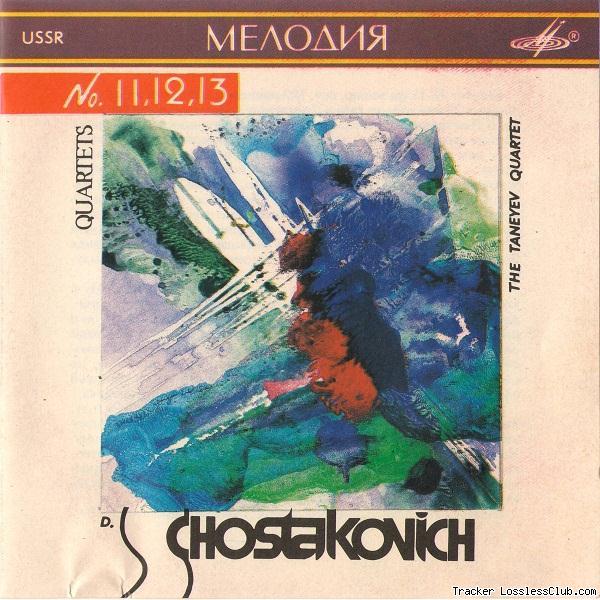Информация об исполнителе
The Taneyev Quartet has rightly earned the reputation as one of the finest Russian string quartets from the latter half of the twentieth century. This talented ensemble has made the Beethoven, Tchaikovsky, Taneyev, and Shostakovich quartets its specialties, though its repertory has been extensive, taking in modern works by Salmanov, Basner, Chernov, and Yevlakhov, as well as other Russian mainstream fare by Glinka, Myaskovsky, Borodin, and, of course, music by a number of composers outside the Russian sphere. The Taneyev Quartet has made numerous recordings, mostly for the old Soviet-era Melodiya label. Many of these efforts have been reissued by Russian Disc, Praga, and other labels.
The Taneyev Quartet was formed in 1946 by four second-year music students at the Leningrad Conservatory who all shared the birth year of 1927. The four players were Vladimir Ovcharek (first violin), Grigory Lutsky (second violin), Vissarion Soloviov (viola), and Veynus Morozov (cello). The original name of the ensemble was the Leningrad Quartet. After graduation (1950-1951) the four players became members of the Yevgeny Mravinsky-led Leningrad Philharmonic Orchestra, but they also managed to maintain a considerable schedule of quartet concerts.
In 1963 the ensemble adopted the name Leningrad Taneyev Quartet, but they would, especially after the breakup of the Soviet Union, become known simply as the Taneyev Quartet. They had decided on the name because Taneyev was one of their favorite composers: they had celebrated the centenary of his birth in 1956 by performing all his quartets in a highly acclaimed series of Leningrad concerts. In the 1960s the ensemble developed a close relationship with Shostakovich, and in 1974 performed the premiere of his Fifteenth Quartet.
By this time, the personnel had changed: Josif Levinzon replaced cellist Morozov in 1967. Two further changes took place in 1984: Alexander Stang replaced Lutsky and Vladimir Stopichev replaced Soloviov. Restrictions on the quartet's travel were lifted around this time, and the Taneyev players were allowed to concertize in Western Europe and the United States. Their first U.S. tour took place in 1989 and was a resounding success. They quickly developed an international reputation, not just from concert appearances but from their recordings of the complete sets of the Beethoven, Tchaikovsky, Shostakovich, and Taneyev quartets.
In the new century the ensemble has remained active on the concert scene, but is still known to the record-buying public largely from its Soviet-era recordings.
The Taneyev Quartet was formed in 1946 by four second-year music students at the Leningrad Conservatory who all shared the birth year of 1927. The four players were Vladimir Ovcharek (first violin), Grigory Lutsky (second violin), Vissarion Soloviov (viola), and Veynus Morozov (cello). The original name of the ensemble was the Leningrad Quartet. After graduation (1950-1951) the four players became members of the Yevgeny Mravinsky-led Leningrad Philharmonic Orchestra, but they also managed to maintain a considerable schedule of quartet concerts.
In 1963 the ensemble adopted the name Leningrad Taneyev Quartet, but they would, especially after the breakup of the Soviet Union, become known simply as the Taneyev Quartet. They had decided on the name because Taneyev was one of their favorite composers: they had celebrated the centenary of his birth in 1956 by performing all his quartets in a highly acclaimed series of Leningrad concerts. In the 1960s the ensemble developed a close relationship with Shostakovich, and in 1974 performed the premiere of his Fifteenth Quartet.
By this time, the personnel had changed: Josif Levinzon replaced cellist Morozov in 1967. Two further changes took place in 1984: Alexander Stang replaced Lutsky and Vladimir Stopichev replaced Soloviov. Restrictions on the quartet's travel were lifted around this time, and the Taneyev players were allowed to concertize in Western Europe and the United States. Their first U.S. tour took place in 1989 and was a resounding success. They quickly developed an international reputation, not just from concert appearances but from their recordings of the complete sets of the Beethoven, Tchaikovsky, Shostakovich, and Taneyev quartets.
In the new century the ensemble has remained active on the concert scene, but is still known to the record-buying public largely from its Soviet-era recordings.
показывать / спрятать больше







 |
|



![The Taneyev Quartet - Dmitri Shostakovich: Quartets Nos. 11, 12, 13 (1991) [FLAC (image + .cue)] The Taneyev Quartet - Dmitri Shostakovich: Quartets Nos. 11, 12, 13 (1991) [FLAC (image + .cue)]](cache/thumbnail42/browse181970.jpg)